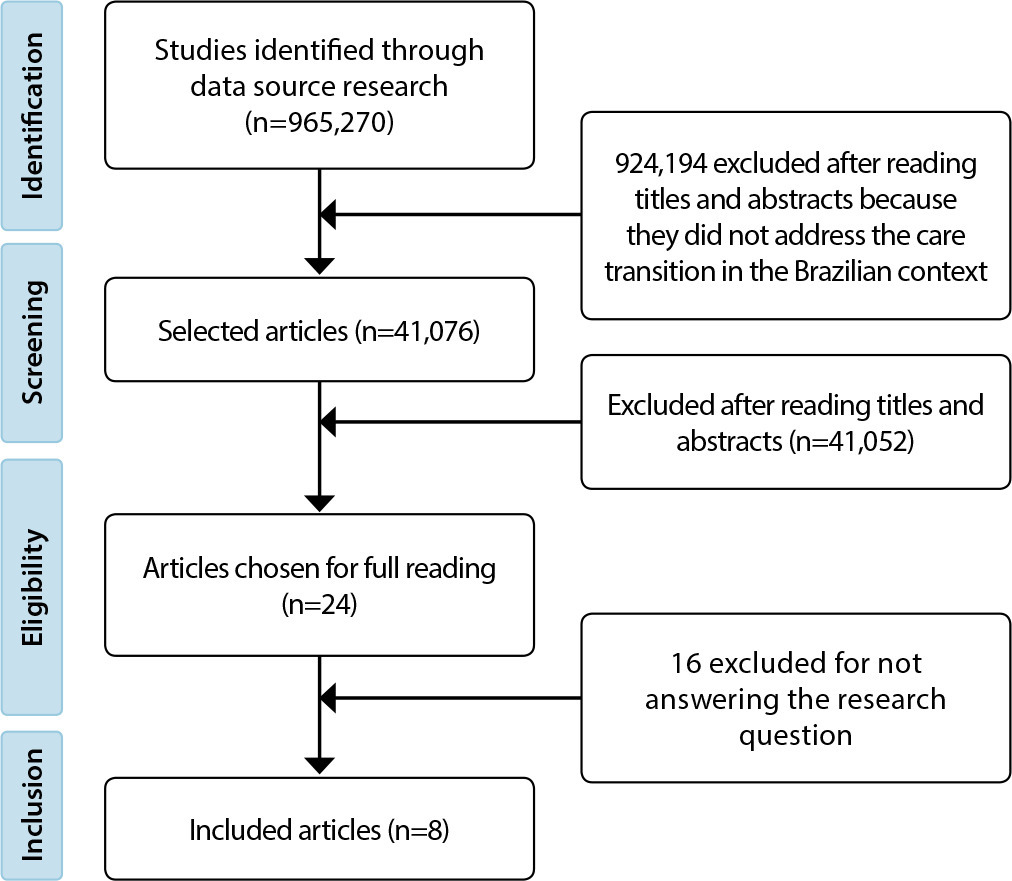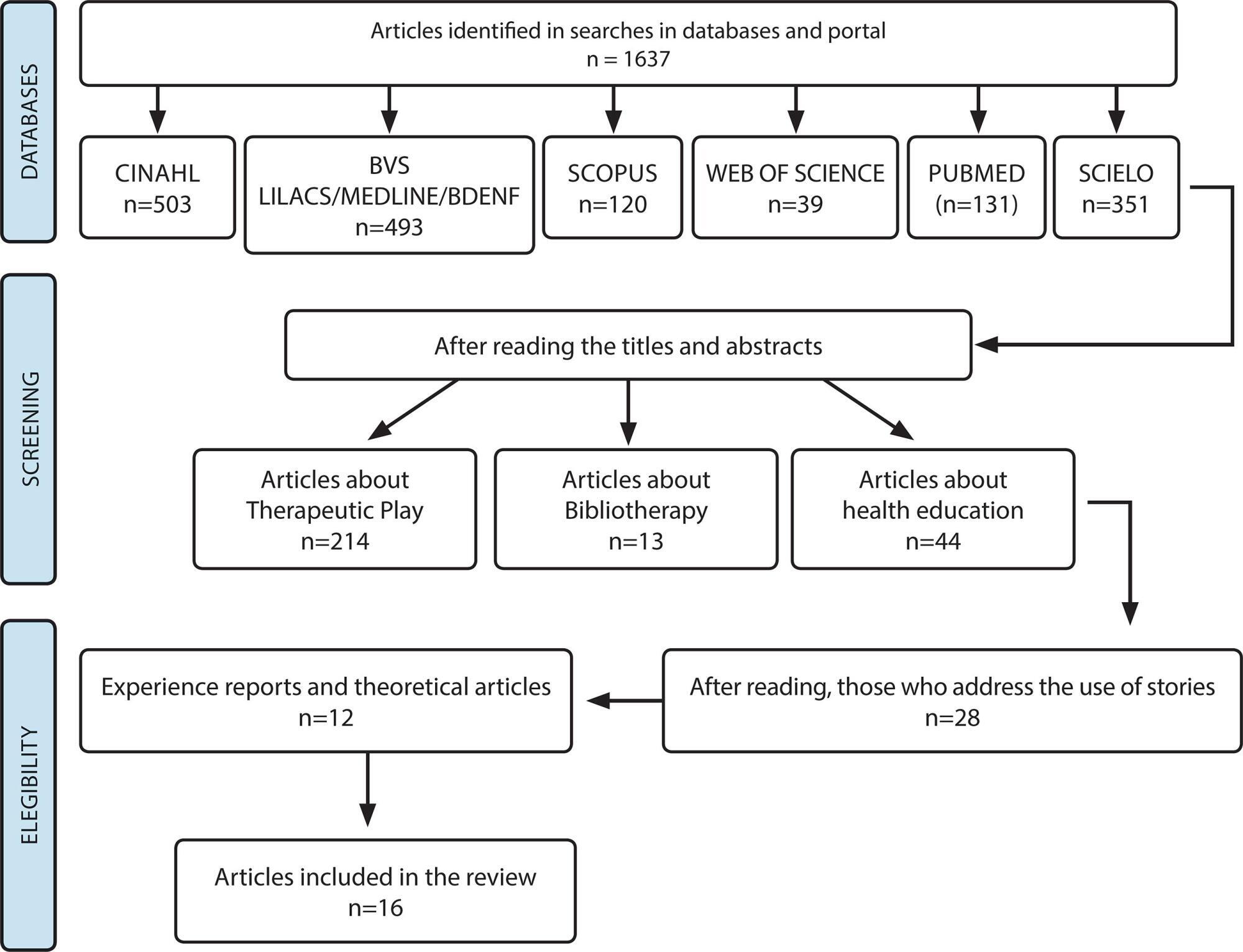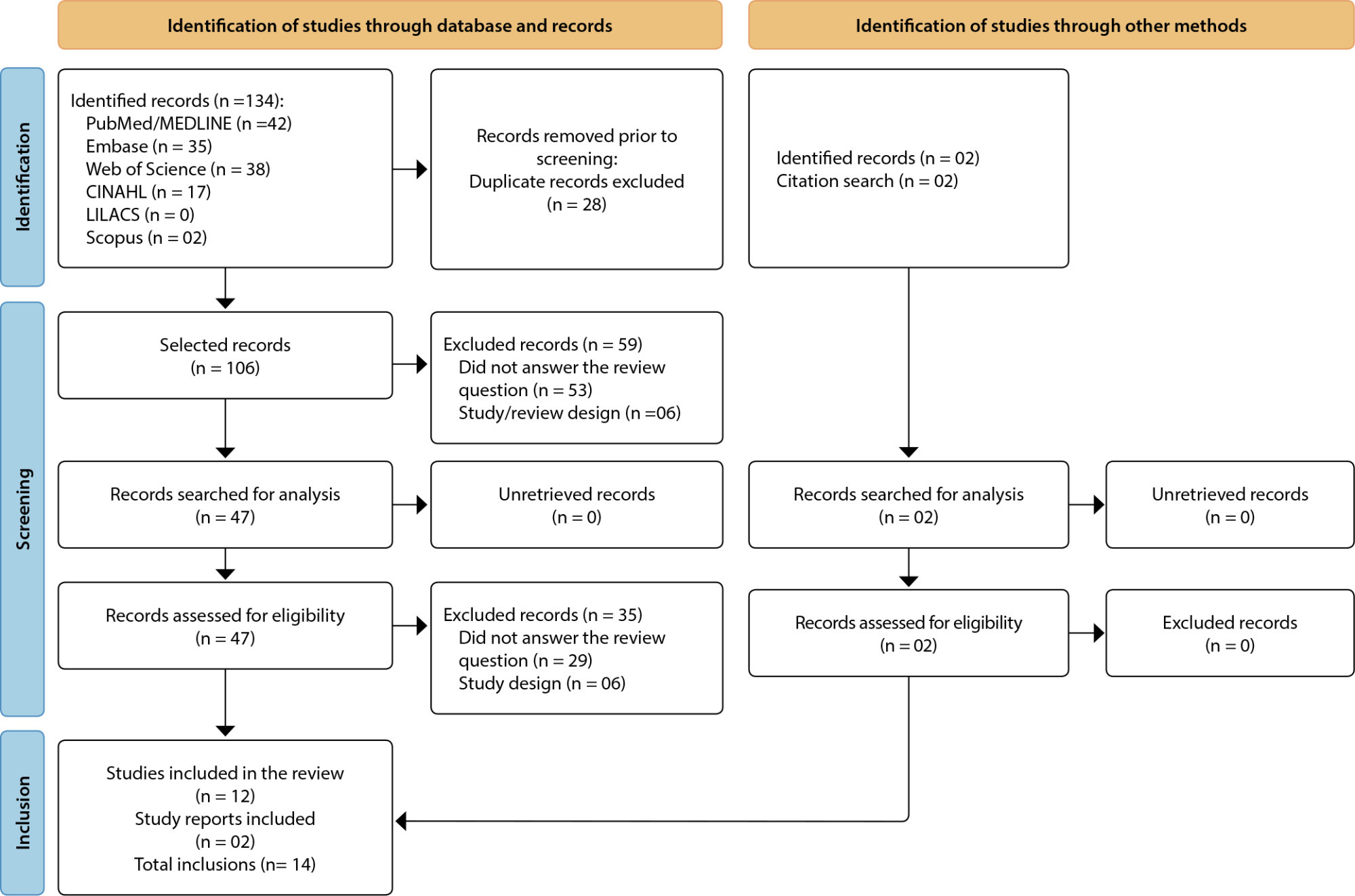-
Maternal Concerns in Home Care for the Premature Newborn: An Integrative Review
Revista Brasileira de Enfermagem. 2023;76(6):e20220769
12-04-2023
Abstract
Maternal Concerns in Home Care for the Premature Newborn: An Integrative Review
Revista Brasileira de Enfermagem. 2023;76(6):e20220769
12-04-2023DOI 10.1590/0034-7167-2022-0769
Views0See moreABSTRACT
Objective:
To identify and analyze the scientific literature, both national and international, concerning the primary maternal concerns about caring for premature newborns at home.
Methods:
This integrative review is based on the guiding question: “What scientific publications from 2012 to 2021 address maternal concerns about the care of premature newborns at home?”. Searches were conducted in the electronic databases: Embase, Medline, Web of Science, Lilacs, Scielo, and Cochrane Library.
Results:
A total of 21 articles were identified. The qualitative analysis showed that maternal concerns pertained to breastfeeding, hygiene, sunbathing practices, managing infant colic, identifying signs, symptoms, and clinical changes, temperature control, and the third phase of the kangaroo method.
Conclusions:
Maternal uncertainties underscore the importance of enhancing strategies focused on supporting families and ensuring continued care for neonates at home.

-
ORIGINAL ARTICLE
Psychometric Properties of an Instrument for Assessing University Administrators’ Knowledge on Gender-Based Violence
Revista Brasileira de Enfermagem. 2023;76(6):e20220770
12-04-2023
Abstract
ORIGINAL ARTICLEPsychometric Properties of an Instrument for Assessing University Administrators’ Knowledge on Gender-Based Violence
Revista Brasileira de Enfermagem. 2023;76(6):e20220770
12-04-2023DOI 10.1590/0034-7167-2022-0770
Views0ABSTRACT
Objective:
To evaluate the factorial structure of the instrument measuring university administrators’ knowledge of gender-based violence.
Methods:
This cross-sectional methodological study was conducted from August to November 2020 with 101 university administrators. Data on demographic and functional characteristics were collected, and the “QUEST VBG UNIV” instrument was applied. Descriptive analysis was performed, the structure of the questionnaire was assessed using exploratory factor analysis (EFA), and the stability of the factors was verified through ORION and FDI tests.
Results:
Of the original 38 items across the 4 sections of the questionnaire, 19 were retained within 2 factors, with appropriate factor loadings. Factor 1 had an explained variance of 15.69%, and Factor 2 had an explained variance of 9.10%. The reliability was deemed satisfactory (ORION > 0.900, FDI > 0.900).
Conclusions:
The questionnaire presented a valid and reliable factorial structure for measuring knowledge about gender-based violence, thereby representing a suitable option for situational assessments in universities.
Keywords:Factor AnalysisGender-Based ViolencePsychometricsStatisticalValidation StudyWorkplace violenceSee more
-
ORIGINAL ARTICLE
Hospital discharge planning in care transition of patients with chronic noncommunicable diseases
Revista Brasileira de Enfermagem. 2023;76(6):e20220772
12-04-2023
Abstract
ORIGINAL ARTICLEHospital discharge planning in care transition of patients with chronic noncommunicable diseases
Revista Brasileira de Enfermagem. 2023;76(6):e20220772
12-04-2023DOI 10.1590/0034-7167-2022-0772
Views0ABSTRACT
Objective:
to analyze care transition in hospital discharge planning for patients with chronic noncommunicable diseases.
Method:
a qualitative study, based on the Care Transitions Intervention theoretical model, with four pillars of intervention, to ensure a safe transition. Twelve professionals participated in a public hospital in the countryside of São Paulo. Data were collected through observation, document analysis and semi-structured interviews.
Results:
there was a commitment of a multidisciplinary team to comprehensive care and involvement of family members in patient care. The documents facilitated communication between professionals and/or levels of care. However, the lack of time to prepare for discharge can lead to fragmented care, impairing communication and jeopardizing a safe transition.
Final considerations:
they were shown to be important elements in discharge planning composition, aiming to ensure a safe care transition, team participation with nurses as main actors, early discharge planning and family involvement.
Keywords:Continuity of Patient CareNurse's RolePatient DischargePatient-Centered CareProcess AssessmentTransitional CareSee more -
ORIGINAL ARTICLE
Meanings of nurses’ role in Child and Adolescent Psychosocial Care Centers
Revista Brasileira de Enfermagem. 2023;76(6):e20230124
12-04-2023
Abstract
ORIGINAL ARTICLEMeanings of nurses’ role in Child and Adolescent Psychosocial Care Centers
Revista Brasileira de Enfermagem. 2023;76(6):e20230124
12-04-2023DOI 10.1590/0034-7167-2023-0124
Views0See moreABSTRACT
Objective:
to analyze the meaning attributed to nurses’ role in mental health care in Child and Adolescent Psychosocial Care Centers.
Methods:
qualitative research, anchored in the paradigm of complexity. Data collection was carried out through online semi-structured interviews with ten nurses from São Paulo, between March and September 2022, being analyzed thematically.
Results:
the diversity and specificity of a child and adolescent mental health clinic, with the need for expanded, territorial and intersectoral care, were unveiled in addition to a fragmented training in the area. There was a need for a deconstruction of being a nurse to make it possible to produce more inclusive and salutogenic practices.
Final considerations:
the need for training nurses with adequate knowledge and skills to care for the mental health of children, adolescents and their families is reinforced as well as permanent education of working teams.
-
Transition of Care for Individuals with Mental Disorders in Brazil: A Contextual Analysis
Revista Brasileira de Enfermagem. 2023;76(6):e20230063
12-04-2023
Abstract
Transition of Care for Individuals with Mental Disorders in Brazil: A Contextual Analysis
Revista Brasileira de Enfermagem. 2023;76(6):e20230063
12-04-2023DOI 10.1590/0034-7167-2023-0063
Views0See moreABSTRACT
Objective:
To describe the contexts of care transition for individuals with mental disorders in the Brazilian setting.
Methods:
A contextual analysis was conducted through a scoping review. The search for studies was conducted in databases and thesis and dissertation portals, and the analysis was based on immediate, specific, general, and meta-contexts.
Results:
The sample, consisting of eight studies, indicated that the following factors are present in the contexts where care transition occurs: Peculiarities of care transition for individuals with mental disorders; Perspectives that can strengthen or weaken this transition; Approaches proposed in the past for the development of care transition; and Elements related to Brazilian legislation.
Final Considerations:
It is observed that the transition of care for individuals with mental disorders in Brazil takes place in various contexts of care levels. These variations present significant potentials and barriers in the care scenarios.

-
ORIGINAL ARTICLE
Effect of cardiovascular biofeedback on nursing staff stress: a randomized controlled clinical trial
Revista Brasileira de Enfermagem. 2023;76(6):e20230069
12-04-2023
Abstract
ORIGINAL ARTICLEEffect of cardiovascular biofeedback on nursing staff stress: a randomized controlled clinical trial
Revista Brasileira de Enfermagem. 2023;76(6):e20230069
12-04-2023DOI 10.1590/0034-7167-2023-0069
Views0See moreABSTRACT
Objective:
to assess the effect of cardiovascular biofeedback on nursing staff stress when compared to an activity without self-monitoring.
Method:
a randomized controlled clinical trial, carried out with nursing professionals from a university hospital. The intervention group (n=58) performed cardiovascular biofeedback, and the control (n=57) performed an online puzzle without self-monitoring, totaling nine meetings over three weeks. The outcome was assessed using the Stress Symptoms and Work-Related Stress scales, and the biological marker heart rate variability. The generalized estimating equations method was used.
Results:
the intervention had no effect on self-reported instruments (p>0.050). However, there was an effect of time (p<0.050) on all heart rate variability indicators, demonstrating changes over the sessions.
Conclusion:
cardiovascular biofeedback showed promising results in the biological marker, suggesting that it can be used in nursing staff as a complementary therapy by promoting better autonomic nervous system regulation.

-
ERRATUM
ERRATUM
Revista Brasileira de Enfermagem. 2023;76(6):e2023n6e06
12-04-2023
Abstract
ERRATUMERRATUM
Revista Brasileira de Enfermagem. 2023;76(6):e2023n6e06
12-04-2023DOI 10.1590/0034-7167.20237606e06
Views0In the article “Undergraduate nursing students’ knowledge and experience in infusion therapy and peripheral vascular acces”, with DOI number: , published in Revista Brasileira de Enfermagem, 2023;76(3): e20220219, authored:Where it read:[…]See more
-
ORIGINAL ARTICLE
Team-Based Learning: a randomized clinical trial in undergraduate nursing
Revista Brasileira de Enfermagem. 2020;73(2):e20180621
03-30-2020
Abstract
ORIGINAL ARTICLETeam-Based Learning: a randomized clinical trial in undergraduate nursing
Revista Brasileira de Enfermagem. 2020;73(2):e20180621
03-30-2020DOI 10.1590/0034-7167-2018-0621
Views0ABSTRACT
Objectives:
To compare the knowledge on surgical safety through the team-based learning methodology and lecture classes for undergraduate Nursing students, and evaluate the learning satisfaction with team-based learning.
Methods:
Randomized, controlled, parallel, two-arm, unblinded clinical trial developed in the Faculty of Medicine of a public university in Botucatu, Brazil. The groups included 14 students for team-based learning and 11 students for lecture classes.
Results:
Students’ apprehension of knowledge in the team-based learning group was significantly higher compared to the control group (p<0.002) by considering the pre-test results. After 30 days, there was no significant difference between groups. The experience with the methodology was considered positive among students.
Conclusions:
Team-based learning is an important pedagogic tool available and has proven effective in education and learning with students playing the role of protagonists.
Keywords:Higher EducationNursingPatient SafetyRandomized Controlled Clinical TrialValidation StudiesSee more
-
Factors associated with anxiety in multiprofessional health care residents during the COVID-19 pandemic
Revista Brasileira de Enfermagem. 2021;74:e20200961
04-14-2021
Abstract
Factors associated with anxiety in multiprofessional health care residents during the COVID-19 pandemic
Revista Brasileira de Enfermagem. 2021;74:e20200961
04-14-2021DOI 10.1590/0034-7167-2020-0961
Views0See moreABSTRACT
Objective:
To estimate the prevalence and factors associated with anxiety among multiprofessional health residents during the COVID-19 pandemic.
Methods:
Cross-sectional study, conducted in July 2020 with multiprofessional health residents (n = 67) from a university hospital. We used the Beck Anxiety Inventory to assess anxiety. Analyzing data through the chi-square test, likelihood ratio, and multiple analysis using Poisson regression with robust variance.
Results:
The proportion of moderate/severe anxiety was 31.3%, which showed significant association with working in sectors involving COVID-19 and directly with suspected/confirmed cases of COVID-19. During the multiple analysis, we found prevalence of anxiety in participants who needed psychological support after entering their residence and those who used psychotropic meds.
Conclusion:
The results seem to indicate that residents had their mental health impaired during the pandemic, but the maintenance of the variables in the model also suggests that they sought help to control anxiety.
-
REVIEW
The use of children’s stories in nursing care for the child: an integrative review
Revista Brasileira de Enfermagem. 2019;72:333-342
12-13-2019
Abstract
REVIEWThe use of children’s stories in nursing care for the child: an integrative review
Revista Brasileira de Enfermagem. 2019;72:333-342
12-13-2019DOI 10.1590/0034-7167-2018-0456
Views0See moreABSTRACT
Objective:
To identify how children’s stories can be used in child care.
Method:
Integrative literature review, conducted in databases between 2000 and 2018, in three languages. Full research articles were included that agreed with the following question: “How can children’s stories be used in child care?”.
Results:
From the analysis of 16 selected articles, three categories emerged: The use of stories in the hospital; Specialized nursing intervention; and Stories in the educational dimension.
Final considerations:
Evidence shows benefits to children, families, institutions and nursing. The use of children’s stories as a care intervention can occur in different situations and settings, values; boosts bonds, reduces anxiety in children and families, encourages children’s participation in care, and promotes health education. It is a low-cost and still incipient strategy in nursing.

-
ORIGINAL ARTICLE
Nursing practices in a psychological care center
Revista Brasileira de Enfermagem. 2020;73(1):e20180175
02-10-2020
Abstract
ORIGINAL ARTICLENursing practices in a psychological care center
Revista Brasileira de Enfermagem. 2020;73(1):e20180175
02-10-2020DOI 10.1590/0034-7167-2018-0175
Views0ABSTRACT
Objective:
To analyze the practices developed by nursing professionals in a Psychosocial Care Center (CAPS).
Method:
A qualitative and evaluative research based on the Fourth Generation Assessment and conducted in a CAPS II of Santa Catarina State in 2014. For data collection, semi-structured interviews, field observation, and data recycling group were used with workers. Constant Comparative Method was used for data analysis.
Results:
Practices aimed at the subject and their clinical, social, prevention, treatment and articulation with the health network were identified. Medication care is a specificity of nursing that aims to promote autonomy and social reintegration. There is a need for greater articulation between the nursing and pharmacy staff, as well as creating spaces for users to talk about medication.
Conclusion:
Nursing practices are focused on biopsychosocial care, aiming to deconstruct care models focused on the disease and symptoms.
Keywords:Health Services EvaluationMental HealthMental Health ServicesNursing ProcessPsychiatric NursingSee more -
REFLECTION
Empathic listening: welcoming strategy for nursing Professional in coping with with the coronavirus pandemic
Revista Brasileira de Enfermagem. 2021;74:e20200721
02-05-2021
Abstract
REFLECTIONEmpathic listening: welcoming strategy for nursing Professional in coping with with the coronavirus pandemic
Revista Brasileira de Enfermagem. 2021;74:e20200721
02-05-2021DOI 10.1590/0034-7167-2020-0721
Views0See moreABSTRACT
Objective:
to reflect on empathic listening use as a welcoming strategy for nursing professionals to cope with the challenges during the pandemic caused by the new coronavirus.
Methods:
this is a reflection study based on updated data surveys and theoretical-conceptual aspects of Non-Violent Communication and empathic listening.
Results:
in the performance during the COVID-19 pandemic, nursing professionals are exposed to violence of different natures related to occupational stress, work overload, anguishes and silenced suffering, with implications for the workers’ health, who can be benefited and strengthened with empathetic listening.
Final considerations:
the health crisis has highlighted the weaknesses of the health system. Nursing acts as the largest contingent of the health workforce in coping with the pandemic. Empathetic listening is a powerful strategy in caring for and strengthening nursing professionals.
-
ORIGINAL ARTICLE
Factors associated with stress, anxiety and depression in nursing professionals in the hospital context
Revista Brasileira de Enfermagem. 2022;75:e20210263
02-25-2022
Abstract
ORIGINAL ARTICLEFactors associated with stress, anxiety and depression in nursing professionals in the hospital context
Revista Brasileira de Enfermagem. 2022;75:e20210263
02-25-2022DOI 10.1590/0034-7167-2021-0263
Views0See moreABSTRACT
Objective:
to determine the factors associated with stress, anxiety and depression, concomitantly, in nursing professionals who work in the hospital context.
Methods:
a quantitative and cross-sectional study with 353 nursing professionals from a hospital. A sociodemographic questionnaire and the Depression, Anxiety and Stress Scale-21 were used. Data were subjected to descriptive statistical analysis, difference and correlation tests.
Results:
the main factors associated with stress, anxiety and depression, concomitantly, were being female, compromised family and social support, lack of autonomy at work, hostile relationship with colleagues, lack of professional recognition and satisfaction, feeling of being overwhelmed and insecurity.
Conclusions:
demographic, physiological, social and work factors impact the levels of stress, anxiety and depression in nursing professionals. The adoption of coping strategies for modifiable factors should be considered, in order to provide better quality of life for these professionals.
-
Repercussions of intestinal ostomy on male sexuality: an integrative review
Revista Brasileira de Enfermagem. 2020;73(6):e20190245
08-10-2020
Abstract
Repercussions of intestinal ostomy on male sexuality: an integrative review
Revista Brasileira de Enfermagem. 2020;73(6):e20190245
08-10-2020DOI 10.1590/0034-7167-2019-0245
Views0INTRODUCTIONThe intestinal ostomy, also known as stoma and ostomy, consists of an artificial opening, produced surgically, whose purpose is to divert the flow of effluents to the external environment. Such a condition can impact the lives of affected individuals due to transformations that affect human multi-dimensionality, including negative repercussions involving sexuality(–).In the United States of […]See more
Search
Search in:
Nuvem de Tags
Aged (144) Atenção Primária à Saúde (239) COVID-19 (104) Cuidados de Enfermagem (269) Educação em Enfermagem (151) Educação em Saúde (139) Enfermagem (930) Estudos de Validação (131) Health Education (144) Idoso (208) Mental Health (149) Nursing (987) Nursing Care (306) Patient Safety (151) Primary Health Care (284) Qualidade de Vida (104) Quality of Life (106) Saúde Mental (145) Segurança do Paciente (150) Validation Studies (108)




